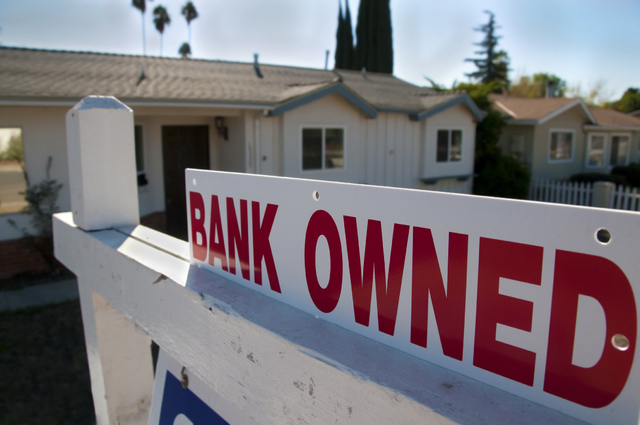Appeals court dashes hopes for foreclosed home investors
CARSON CITY — Real estate investors who took advantage of a Nevada law during the foreclosure crisis to acquire several thousand foreclosed homes at bargain prices got what could be bad news recently courtesy of the Ninth Circuit Court of Appeals.
In a 2-1 decision Aug. 12, a court panel said a Nevada law requiring mortgage lenders to be alerted of a foreclosure by a homeowners association only if the lender had requested notice is unconstitutional. The panel said the requirement of an “opt-in” request is a violation of the 14th Amendment requiring due process.
In the specific case, the court sent the case favoring Wells Fargo Bank and against the Bourne Valley Court Trust back to District Court for further proceedings.
The complex disputes over Nevada’s foreclosure laws date to the foreclosure crisis that began in 2008. The law was changed by the Nevada Legislature in 2015 to resolve the notice issue and other concerns.
But if the appeals court ruling is upheld, the acquisition of thousands of homes by investors who paid just a few thousand dollars to satisfy HOA-filed super-priority liens could be in jeopardy. The sales could be nullified because of the Ninth Circuit ruling, restoring the status of the foreclosed homes with the mortgage lenders again holding valid liens.
Las Vegas attorney Michael Bohn, who represents the Bourne Valley Court Trust in the dispute, has asked the Ninth Circuit to put the decision on hold and not formally publish the opinion to prevent it from being cited in legal proceedings in state and federal court.
WILL HIGH COURT RULE?
Bohn, who has 320 similar cases in the state and federal court system, said he expects the Nevada Supreme Court to soon take up the issue of the constitutionality of the opt-in requirement in a separate case. The appeals court should wait until that case is ruled upon, Bohn said in an emergency motion. He also plans to ask the appeals court for a rehearing.
The Nevada Supreme Court has scheduled oral arguments in its case, Saticoy Bay LLC Series 350 Durango 104 v. Wells Fargo, for Sept. 8, Bohn said in the motion.
But Tucson attorney Andrew Jacobs, who argued the case for Wells Fargo on appeal, filed a motion opposing any delay in publishing the opinion, saying it is unwarranted. Jacobs said in his motion there is no guarantee the state’s high court will address the constitutional issue ruled on by the Ninth Circuit.
“There is no emergency, and there is no reason to accord Bourne Valley the extraordinary relief it seeks,” Jacobs said in his motion.
In a major foreclosure ruling from the Nevada Supreme Court in 2014 in SFR Investments Pool 1 vs. U.S. Bank, the court said paying off the super-priority lien held by a homeowners association for nine months of unpaid dues extinguished all other lesser interests in the property, including even a mortgage lender’s first deed of trust.
In the Wells Fargo case, an investor paid $4,145 at a foreclosure sale to satisfy the association’s “super-priority lien” for uncollected dues on the property located at 410 Horse Pointe Avenue in North Las Vegas. The property was then conveyed to the Bourne Valley Court Trust.
The mortgage of $174,000 made to the original homeowner and held by Wells Fargo was extinguished with the foreclosure sale based on the court’s 2014 super-priority lien decision.
In a court filing in the case, Jacobs said: “Bourne Valley makes no attempt to explain how a sale of a property for three percent of its fair market value is commercially reasonable — because it cannot possibly be.”
The U.S. District Court, relying on the 2014 ruling by the Supreme Court, granted summary judgment to Bourne Valley. Wells Fargo appealed.
LOWER COURT REVERSED
The appeals court reversed the lower court and ordered the matter back for further proceedings, finding that the state law regarding foreclosure notice impermissibly shifted the burden to mortgage lenders by requiring them to affirmatively request notice.
Wells Fargo provided a brief statement: “Wells Fargo is pleased by the Ninth Circuit’s decision in the Bourne Valley case, and agrees with it. We would defer further comment at this time as many issues remain in litigation.”
The stakes are huge for those who acquired an estimated 2,000 to 3,000 properties by paying off HOA super-priority liens. There also are implications for the HOAs if the transactions are voided as a result of the Ninth Circuit decision.
A number of real estate investors adopted the strategy of paying off the super priority lien with the expectation that the first mortgage then would be extinguished, creating a financial windfall for many of the speculators.
Because of the legal disputes and questions over ownership, none of the properties can be sold because they have clouded titles. Additional rulings by Nevada and federal courts will be required to finally resolve the issue for all parties.
“This holding will affect many lawsuits in federal courts seated in Nevada, and may affect hundreds of lawsuits in Nevada State courts between mortgage lenders and investors who have bought HOA-foreclosed properties,” said an analysis of the ruling by attorneys with Ballard Spahr LLP of Phoenix.
Contact Sean Whaley at swhaley@reviewjournal.com. Follow @seanw801 on Twitter.














